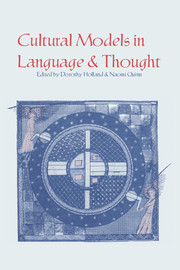Book contents
- Frontmatter
- Contents
- Preface
- List of Contributors
- Introduction
- Part I Presupposed worlds, language, and discourse
- Part II Reasoning and problem solving from presupposed worlds
- Part III The role of metaphor and analogy in representing knowledge of presupposed worlds
- Part IV Negotiating social and psychological realities
- 11 Myth and experience in the Trobriand Islands
- 12 Goals, events, and understanding in Ifaluk emotion theory
- 13 Ecuadorian illness stories
- 14 Explanatory systems in oral life stories
- Part V An appraisal
- Index
12 - Goals, events, and understanding in Ifaluk emotion theory
Published online by Cambridge University Press: 05 June 2012
- Frontmatter
- Contents
- Preface
- List of Contributors
- Introduction
- Part I Presupposed worlds, language, and discourse
- Part II Reasoning and problem solving from presupposed worlds
- Part III The role of metaphor and analogy in representing knowledge of presupposed worlds
- Part IV Negotiating social and psychological realities
- 11 Myth and experience in the Trobriand Islands
- 12 Goals, events, and understanding in Ifaluk emotion theory
- 13 Ecuadorian illness stories
- 14 Explanatory systems in oral life stories
- Part V An appraisal
- Index
Summary
I have three goals in this paper. The first is to represent formally the knowledge about emotions held by the Ifaluk people of Micronesia. That knowledge can be seen to be structured in two fundamental ways: The first is in terms of salient events in everyday life, and the second is in terms of the culturally constructed goals held by the Ifaluk. The second aim is to address the question of the actual status of ethnotheory in social interaction; I stress the idea that the emotional understanding this ethnotheory allows is, in actual practice, an understanding that is negotiated between individuals. Third, I reject the view that ethnotheoretic models of emotion are aptly characterized as involving “cognition about emotion” or “thinking about feeling.”
Introduction
I would like to tell two stories here. To understand each story, it is necessary to present the underlying cultural and cognitive model that structures the understanding of the characters in them. The first story is a simple one because it merely involves narration, an assertion made by one character and left unanswered by others. The complexity of the second story arises because it tells a more fully social tale; the characters not only theorize, they also attempt to convince others that their theory is at least plausible, if not the only possible route to proper understanding of the events at hand.
- Type
- Chapter
- Information
- Cultural Models in Language and Thought , pp. 290 - 312Publisher: Cambridge University PressPrint publication year: 1987
- 54
- Cited by



